Washington Nationals Trade Deadline Preview

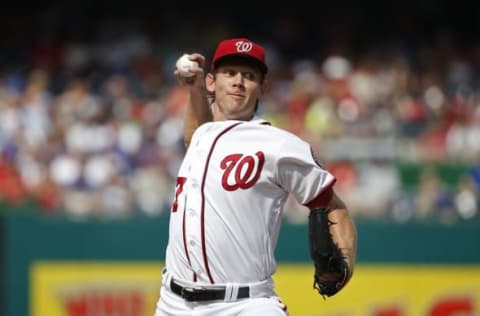
As the Washington Nationals position themselves for the playoffs, what moves will they make to win their first championship?
The Washington Nationals are cruising towards a return to the playoffs.
With a five game lead in the National League East over the hobbled New York Mets, the Nats are in great shape to win the division and avoid the Wild Card round. Aside from gambling on winning a one-game playoff to make the NL Divisional Series, taking the East would allow manager Dusty Baker to arrange his starting rotation for the long road ahead.
As June slides into July, Washington possesses great strengths, few weaknesses and a couple glaring holes. As those filing into Nationals Park or spend an evening watching Bob Carpenter on MASN know—aside from the growing crush the region has on Wilson Ramos—they can beat the bad teams, but they struggle with the cream of the NL. Case in point against the Chicago Cubs, the Nationals are 2-5. At Wrigley Field, they were swept in four. With a West Coast trip on the way how they do against the San Francisco Giants, and the Los Angeles Dodgers to a lesser degree, will go a long way determining what needs addressing before the trade deadline.
The good news is Washington is pummeling the weak NL East. Going 21-10 against the Atlanta Braves, Philadelphia Phillies and Miami Marlins combined, they are winning the games they need to. The road ahead in the East shows 13 games left against the Braves and Mets and six apiece with the Phills and Marlins.
Winning the East, however, is not good enough. With the money locked into the starting rotation, this team is built for October. With some adjustments, they can go into November.
Next: The Power of Hitting
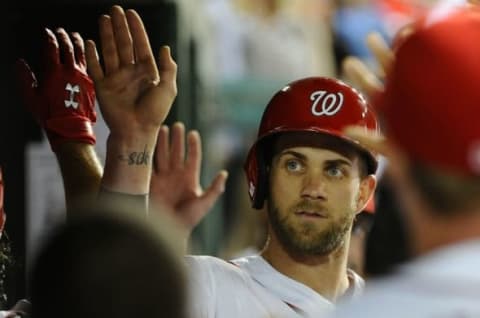
OFFENSE
Five Nationals hitters are into double-digits in home runs. With 87, the team leads the NL. Bryce Harper has 13 himself. When they make contact, the ball flies.
If they did a better job making contact. With a team slash line of .251/.324/.426, Washington is on the bottom-tier getting on base. The batting average is eighth in the NL while the on-base percentage is ninth. Slugging percentage, however, is fourth. Their 299 runs rank fifth in the league.
Nothing about those numbers should worry anybody. Outside of Michael Taylor, who is finding his way in center field, no one is struggling, but no one out outside Ramos and Daniel Murphy is raking the ball. Since coming over from the Mets, Murphy is hitting .361 and carries an Adjusted OPS+ of 162. If you are worried about the slumping Harper, those 54 walks still show his OBP at .409 and OPS+ at 141. (Yes kids, walks and sabermetrics are good friends.)
With Chris Heisey and Stephen Drew producing off the bench and Ben Revere patrolling the outfield, they fit the rest of the offensive puzzle well.
As a team, despite the lower ranking, they are a solid core of veterans and youth.
Next: What about the rotation?
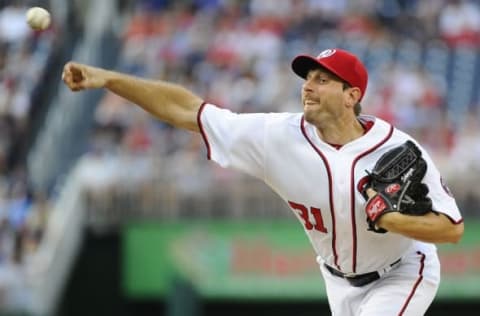
PITCHING
The backbone of the Nationals is their starting pitching. Yet, there is a potential hole on the back end.
Anyone who watches Max Scherzer or Stephen Strasburg regularly enjoys them unless you are hitting. Scherzer’s stuff is so filthy, he can mix sliders in the 80s and fastballs at 96 with such precision you would think he is tossing a yo-yo out there. Pull the string and watch batters swing and miss.
Strasburg is undefeated at 10-0, showing such control he has a K-to-BB ratio of 4.78. Scherzer’s is 4.72.
The best ERA, however, belongs to Tanner Roark. If you wonder why won-loss records are considered a weak stat, consider Roark is 5-4 with an ERA of 2.93. For the record, Strasburg’s is 3.03.
If there is a concern with the front three and Joe Ross—holding his own at 5-4 with an ERA of 3.01—is the long ball, particularly Scherzer. Allowing 17 homers in 13 starts, a lot of good work come October can be done with one hanging pitch. No one else is allowing more than 1.0-per-9, but with a staff of hard throwers ball thrown hard and hit land farther than expected.
Another thing to watch for, no Nats starter has missed his turn in the rotation. Like with the offense, they are not needing to bolster the rotation unless injuries hit.
Next: Closing The Door
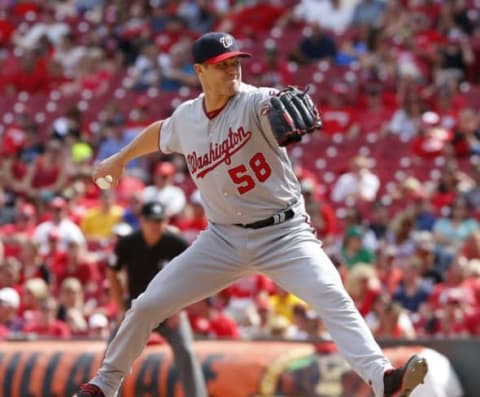
CLOSER
Dusty Baker has two holes to monitor.
The big one is at closer. Even before Jonathan Papelbon landed on the disabled list, his numbers were not what you expect from your closer. In 24.2 innings, he surrendered 25 hits, nine earned runs, two home runs and eight walks. Rumors of chasing New York Yankees relievers Andrew Miller and Aroldis Chapman are making the rounds.
Chapman, a potential free agent who can hit 102 with his fastball, is a realistic target if the Yankees sell and take Papelbon in return. Known for his abrasive personality, it is hard to imagine Papelbon being set aside for another closer on a championship team.
It is also hard seeing the Yankees as sellers. Sure Chapman is likely gone after this year, but they are 3.5 out in what promises to be a massive race for the American League Wild Card.
Will Washington dangle prospects to get the Yankees or Los Angeles Angels to budge? The Angels are nearly playing out the string now and have Huston Street or the injured Joe Smith as closers. Although not ideal, they are a plan “B” if New York stands pat.
Next: Gio's Dilemma
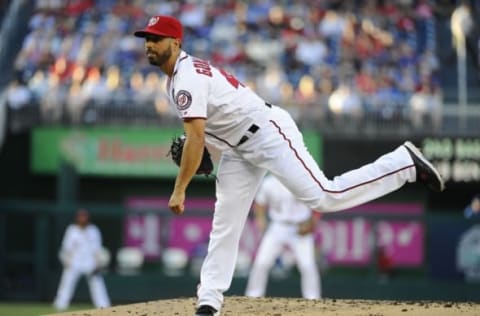
WITHER GIO?
The other concern is the fading Gio Gonzalez.
Baker and pitching guru Mike Maddux have to be scratching their heads as Gonzalez continues stumble. In his last five starts, he is 0-4 with an ERA of 7.45. Hurling 29 innings, he struck out 40 but allowed 35 hits and 24 earned runs. He seems to throw past batters instead of pitching. It is wonderful to whiff 12.4-per-9, it is another to have an opponent’s batting average of .297 and a BABIP of .405. Sure, the last week has looked better, 10 hits in 13.1 innings, but the body language has not.
Although in no danger of losing his spot in the rotation, a playoff team would eat him alive.
Will the brain trust go with Joe Ross as a fourth starter or do they get a veteran for the role. Unless Gonzalez can settle in and get hitters out, he is a playoff liability.
Time is on Gonzalez’s side as he has six weeks left to convince everyone he is ready for the long push ahead. Maddux works wonders, getting Gonzalez on track is doable.
Still, watch if the Nats score another starter.
Next: Prediction Time
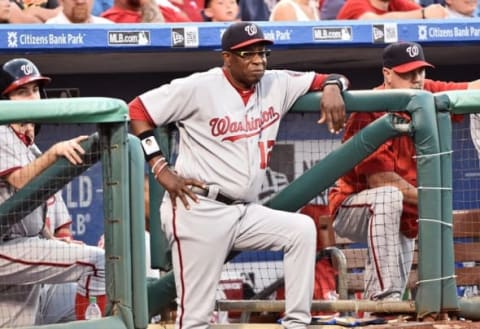
CONTRACTS AND CONCLUSIONS
If needed, the Nationals have a little payroll flexibility.
Currently, they are at $144.6 million with Strasburg now signed long term. Next year’s number sits at $98 million with Harper hitting arbitration and Papelbon’s $11 million gone.
If they can move Papelbon now for another closer, that is the best move they can make.
More from Call to the Pen
- Philadelphia Phillies, ready for a stretch run, bomb St. Louis Cardinals
- Philadelphia Phillies: The 4 players on the franchise’s Mount Rushmore
- Boston Red Sox fans should be upset over Mookie Betts’ comment
- Analyzing the Boston Red Sox trade for Dave Henderson and Spike Owen
- 2023 MLB postseason likely to have a strange look without Yankees, Red Sox, Cardinals
Although the team needs to bolster the closer and bullpen, do not expect top prospects such as Trea Turner or Lucas Giolito to go anywhere but Washington. There is no reason to mortgage the future here to win now.
In the end, the Nationals go into the pennant chase as the best team on paper in the NL East. Much like the Cubs, they play well as a whole team. There is not a squad who could not use a bullpen arm or two or another bat.
If they stood pat and keep Papelbon, the chances of making the playoff remain excellent.
Yet, 2016 is not about just getting there. Washington will assume in order to win the pennant they have to beat the Cubs. Finding a better closer is essential to finish the job.
Next: Mets Trade Deadline Preview
With a core of younger players, fans hope the this is the beginning of a three-five season window. Still, you never know when the next chance will be. Washington needs to treat this one like there is no tomorrow.